IHSPR Newsletter - November 2013
Table of Contents
- Message from Dr. Robyn Tamblyn, IHSPR Scientific Director
- Institute Advisory Board (IAB) Message
- Funding News
- The New Open Suite of Programs and Peer Review Process – Montreal Boot Camp
- eHealth Priority Setting Workshop
- Community-based Primary Health Care (CBPHC) Innovation Teams Annual Meeting
- IAB Update
- IAB Meeting – 5 à 7 Reception
- Announcements
- Conferences
- Did You Know?
- Got Good News?
Message from Dr. Robyn Tamblyn, IHSPR Scientific Director

Photo: Robyn Tamblyn,
IHSPR Scientific Director
As the IHSPR Community continues to investigate, collaborate and innovate to further the health of Canadians, it's important to recognize the varied scope of our field, the value that this variety brings to the health care system, and some of the leaders at the forefront of health services and policy innovation.
Our Institute Advisory Board (IAB) members are on the cutting edge of health services and policy research across Canada and internationally and our monthly IAB Message illustrates their passion and dedication for evidence-informed health care system transformation.
This month, learn about our IAB member Krista Connell (CEO, Nova Scotia Health Research Foundation) and her important contributions towards supporting and advancing the field of health services and policy research. Krista plays a key role in guiding our community towards success in the upcoming CIHR funding reforms.
I would also like to draw your attention to the launch of the Network Development Funds competition for the SPOR Network in Primary and Integrated Health Care Innovations. This Network is intended to be a game changer. It will foster a new alliance between research, policy and practice with the aim of creating dynamic and responsive learning systems across the country that support evidence-informed transformation and delivery of primary and integrated health care to improve health, health equity, and health system outcomes, particularly for individuals with or at risk of developing complex health needs. Please visit the funding opportunity, register for one of our upcoming information webinars (details below), or contact us to learn more.
— Robyn Tamblyn
Follow me on Twitter!
Institute Advisory Board (IAB) Message

Photo: Krista Connell,
IAB Member
It is my belief that solutions to the challenges the health system(s) in Canada face can only come from the active engagement of health services, health policy, population and public health researchers. Seeking answers to the questions that haunt health system decision-makers so that they can be as informed as possible is the only way that thoughtful and appropriate strategies can be developed. The NSHRF has developed an approach to addressing the knowledge needs of decision-makers – the REAL (Relevant, Excellent, Accessible, and Legitimate) Knowledge Program, a methodical approach to ensuring information is useful and pertinent. It's about quality, appropriateness and understanding what the information is really saying and how it applies to the context in which decisions are made. Once the REAL Knowledge process unfolds, decision-makers have greater insight, reliable data, and enhanced understanding. They have a strong, consistent foundation on which to make and implement decisions that will spur REAL change! IHSPR's Evidence on Tap and Best Brains Exchange are other national programs I support as they provide a rapid and robust response to policy makers' evidence needs.
Of course the health system(s) in Canada are hardly static, so the generation of new knowledge is as critical an element in informed decision-making as feeding children is to raising healthy, happy, and successful adults! As a member of the IHSPR IAB, I believe that we need robust health services and policy research in Canada if we are to meet the ever-changing need for evidence, and we are fortunate to have a great community of Health Services and Policy (HSP) researchers in Canada. Those of us in the business of providing support to the research community must ensure that these HSP researchers are well positioned for success.
Recently I attended IHSPR, IPPH and IGH's "A Community Call to Action: Reforms Bootcamp", a forum to prepare the Pillar III (Health Services and Policy) and IV (Population and Public Health) communities for success in light of the OOGP reforms. The Bootcamp presented data that outlined historical differences in funding, application and review trends across CIHR's four Pillars; highlighted areas where the Pillar III and IV communities could improve to optimize success in the OOGP reforms; and fostered some lively discussions about strategies for success and how to move forward. More about the Reforms and Bootcamp will be made available in this issue of the IHSPR newsletter and in the coming weeks, so stay tuned!
I have initiated conversations with institutions in Nova Scotia regarding the development of a strategy specifically targeted to researchers engaged in Pillar III and IV research here in Nova Scotia, with a focus on engaging more of our Social Scientists who explore health issues. Our aim will be to "feed" this community so that they are well positioned for success in the upcoming competitions.
In order to get REAL in Nova Scotia we need to be able to generate new knowledge! I challenge others in a position to help "feed" this community of researchers to join me in developing strategies for success in their departments, faculties, universities and jurisdictions!
Views expressed are those of the author and do not necessarily reflect the position of CIHR.
Funding News
Announcing: SPOR Network in Primary and Integrated Health Care Innovations
The SPOR Network in Primary and Integrated Health Care Innovations is a key CIHR initiative under the Strategy for Patient-Oriented Research and the Community-Based Primary Health Care Signature Initiative. The Network builds on provincial/territorial/federal networks and national assets in community-based primary health care. It will foster a new alliance between research, policy and practice to create dynamic and responsive learning networks that develop, evaluate and scale up new approaches to the delivery of integrated and cost-effective services across and beyond sectors of health care; and contribute to improved health, health equity, and health system outcomes.
The Network will focus on new approaches to the delivery of primary and integrated health care (including primary prevention) both horizontally and vertically across the care continuum to address:
- individuals with complex needs across the life course, showing capacity to evolve the network's scope over time to include age groups from children to older adults; and,
- multisector integration of upstream prevention strategies and care delivery models. A key element of this focus is the assessment of upstream predictors of high system use and subsequent identification and targeting of prevention strategies and interventions.
SPOR Network in Primary and Integrated Health Care Innovations – Network Development Funds Competition
Application Deadline: January 10, 2014
Objectives:
- Support the creation and further development of formal member networks in provincial, territorial and federal jurisdictions (a jurisdiction can be provincial, territorial, federal or a combination of more than one province and/or territory) that meet the membership requirements of the SPOR Network in Primary and Integrated Health Care Innovations; and,
- Support member networks to meet the requirements for integration into the SPOR Network in Primary and Integrated Health Care Innovations.
Watch our November Webinar or contact Hawa Kombian (hkombian.ihspr@mcgill.ca) for more information.
Reforms of Open Programs
To support the transition to the new Open Suite of Programs and peer review processes, a measured, multi-year approach is being implemented. A component of this approach includes the introduction of the Foundation Scheme through two "live pilot" competitions and the phasing out of the Open Operating Grant Program. We expect that this transition will take place between 2014 and 2016. However – as we have noted in other communications - course corrections and adjustments may be required along the way as we learn from the results of the pilots; the community will be kept informed should changes be made.
We are pleased to announce that the funding opportunities for the 2014 Foundation Scheme "live pilot" and the 2014-2015 Transitional OOGP competitions have been published.
We encourage you to learn more about the changes as we move into the transition phase. If you have any questions regarding these funding opportunities, please visit the CIHR website, or contact the CIHR Reforms team.
CIHR Planning Grants and Dissemination Events
Please note that the Planning Grants and Dissemination Events programs will no longer be offered in their current format after the Fall 2013 competition. CIHR recognizes the importance of planning and dissemination activities and will continue to support these activities through the Institute Community Support (ICS) Program going forward.
The new planning and dissemination program under the ICS model is proposed to launch twice per year with application intakes in February and August. Please visit ResearchNet in mid-December 2013 for more details on this funding opportunity.
If you have any questions about the ICS Program, please contact Jennifer Lee, Institutes Transitions and Programs Lead at ICS-PD@cihr-irsc.gc.ca or 613-952-4539.
New Investigator Salary Award: Winter 2013 Priority Announcement
Application deadline: December 2, 2013
The New Investigator Salary Award program is designed to provide outstanding New Investigators the opportunity to develop and demonstrate their scientific independence in initiating and conducting programs of health research through salary support. IHSPR and Institute of Population and Public Health will provide funding for New Investigator Award applications in the area of Community-Based Primary Health Care (CBPHC) that have a primary focus on innovative models for chronic disease prevention and management in CBPHC and/or improving access to appropriate CBPHC for vulnerable populations.
View the October webinar
Science Policy Fellowship
Application Deadline: December 16, 2013
This program was designed with the goal of establishing and nurturing critical links between policy makers and external researchers in support of evidence-based public policy by providing short-term policy assignments. These short-term assignments will provide Fellows with the opportunity to learn about how government works and how public policies are made. For their part, policy-makers will have immediate access to individuals, trained in a particular scientific area, and will be able to engage with them on the scientific/technical aspects of public policy issues.
Read our profile on one of last year's Science Policy Fellows
Travel Awards (for trainees and new investigators)
Launch: December 2013
Application Deadline: January 2014
IHSPR will launch its next ICS Travel Awards competition in December. These awards enable students, postdoctoral fellows, and new investigators to present their research at national and international meetings and/or conferences that are related to IHSPR's priority research areas.
The maximum amount for a single award is $1,500.
For more information and to submit an application, please visit the CIHR Funding Opportunity Database in December.
IHSPR Article of the Year and Rising Star Awards
Application deadlines: February 14, 2014
The Article of the Year Award recognizes published research that has significantly contributed to the advancement of the field of health services and policy research in Canada while the Rising Star Award recognizes the research excellence and knowledge translation initiatives of graduate students and post-doctoral fellows.
CIHR Barer-Flood Prize in Health Services and Policy Research
Application deadline: May 1, 2014
The CIHR Barer-Flood Prize for Health Services and Policy Research is a career achievement award that honours and recognizes an exceptional researcher in the area of health services and policy research who has created a seminal body of work that has had a substantial impact on health services and policy research, policy and/or care delivery.
Read more on the 2013 award winner, Dr. Andreas Laupacis
Preparing the community for success in CIHR’s New Open Suite of Programs and Peer Review Process – The Montreal Bootcamp
CIHR is redesigning its Open Suite of Programs and peer review process. The current suite of CIHR Open Programs (including the open operating grants program) will be replaced by two new funding schemes (a foundation scheme and a project scheme) and a new peer review process. The overall goal of the "Open Reforms" is to contribute to a sustainable Canadian health research enterprise by supporting world-class researchers in the conduct of research and its translation across the full spectrum of health, and to ensure the reliability, consistency, fairness and efficiency of the competition and peer review processes. The Open Reforms will bring important changes to the way we write and review grants, particularly for the foundation scheme, and IHSPR is working with the Institute of Population and Public Health (IPPH) and the Institute of Gender and Health (IGH) to help prepare the health services and policy and population and public health research communities for success in the new schemes.
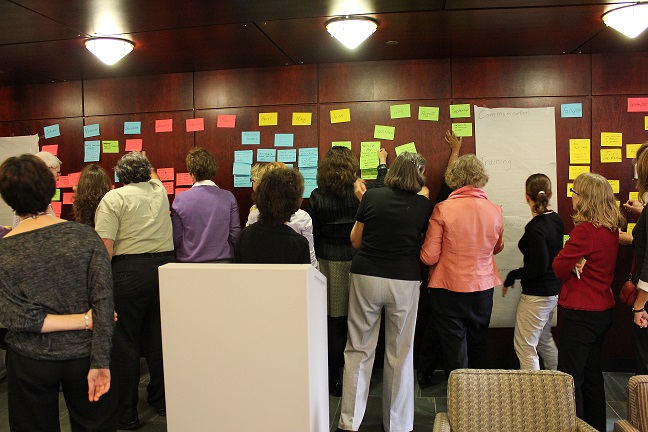
Photo: Boot camp participants creating the action plan
The foundation scheme is designed to contribute to a sustainable foundation of health research leaders by providing long-term support (seven years for established investigators and five years for new/early investigators) to pursue innovative, high-impact programs of research. The project scheme will support ideas with the greatest potential for important advances in health-related knowledge, health care, health systems and/or health outcomes, by supporting projects with a specific purpose and defined endpoint. Important information about the reforms, including details of the two schemes, 2014-2015 Transitional OOGP, 2014 Foundation Scheme "live pilot" (and eligibility criteria for these pilots) and frequently asked questions are available on CIHR's Reforms of Open Programs and Peer Review webpages and we strongly encourage you to familiarize yourself with this information.
The programmatic nature of the foundation scheme will require a culture shift in the writing and reviewing of grants within the health services and policy and population and public health research communities. With this in mind, CIHR IHSPR, IGH and IPPH are leading an initiative to prepare the communities for success. The first component of this initiative involved a series of expert working groups comprised of nominated thought-leaders from across the country who were charged with the task of developing a set of concrete tools to guide the community towards excellence in the areas of programmatic grant writing, peer review and monitoring and evaluation.
The second component involved an Open Operating Grants and Peer Review Reform Bootcamp, which was hosted in Montreal on October 10-11 and brought these leaders together with provincial health research funding organizations and CIHR partners. The goal of the Bootcamp was to develop a consensus on excellence in programmatic grants and the review of these grants, and to develop a concrete toolkit and action plan for dissemination. Stay tuned for information on the toolkit and in the meantime, please visit CIHR's Reforms of Open Programs and Peer Review webpages, familiarize yourself with the information, and start to prepare.
Funding Opportunities:
2014 Foundation Scheme "live pilot"
2014-2015 Transitional OOGP
eHealth Innovations Priority-Setting Workshop
On October 15-16 we brought together leading researchers, industry and association representatives, policy makers and key funding stakeholders from Canada and abroad to discuss opportunities for developing eHealth Innovations research opportunities in Canada. The primary objectives of the workshop were to identify eHealth priority research areas related to mental health and high systems users with complex needs as well as to identify key conditions to effectively develop public-private research partnerships.
Several important themes were highlighted repeatedly; first, there was consensus that targeting high system users with complex needs and tools for early mental health detection and intervention are key for generating a positive impact on patients, their caregivers, health providers and the promotion of transformative change in the health system. Second, the need to keep patients at the centre of eHealth innovations by providing tools to participate in their own health care is crucial. Finally, it is important for industry partners to have access to live health system ‘laboratories' for evaluating the clinical benefit, comparative cost-effectiveness of innovations as well as mechanisms to work with researchers to evaluate co-produced solutions. A full report on the key themes and action steps for moving forward in the area of eHealth is currently under development.
Contact Cecilia van Egmond at Cecilia.vanEgmond@cihr-irsc.gc.ca for further information on this initiative.
First Annual Meeting of the Community-based Primary Health Care (CBPHC) Innovation Teams
The CBPHC Innovation Teams are a flagship program of CIHR's CBPHC Signature Initiative, co-led by IHSPR and the Institute of Population and Public Health (IPPH). The $33M investment made in April 2013 by CIHR and partners supported 12 world-class teams to lead highly innovative cross-jurisdictional research programs over the next five years to improve the delivery of high-quality CBPHC in Canada and internationally. The teams' research focuses on two priority areas within CBPHC, including improved chronic disease prevention and management and reduced inequities in access and health outcomes for vulnerable populations.
IHSPR and IPPH co-hosted the first annual team meeting on October 28th and 29th in Toronto, Ontario. The meeting brought together the researcher and decision maker leads of each team as well as the funding partners to create a forum for knowledge exchange and cross-team collaboration. Teams presented on their cross-jurisdictional programs of research, anticipated impacts, and highlighted key opportunities for cross-learning and collaboration in research, capacity building, knowledge translation and evaluation.
A special session to determine a common set of contextual and outcome measures for use by each team, led in partnership with the Canadian Institute for Health Information, helped to demonstrate the potential to optimize the cumulative learning of the teams and program overall and help to ensure that the teams' CBPHC delivery models are of relevance across diverse settings and contexts. To learn more about the 12 CBPHC Innovation Teams, visit the CBPHC Signature Initiative website.
Institute Advisory Board Update
IHSPR is pleased to welcome Stirling Bryan and Rick Glazier to the IAB.
.jpg)
Stirling Bryan, PhD
Director
Centre for Clinical Epidemiology & Evaluation
Vancouver Coastal Health Research Institute
.jpg)
Rick Glazier, MD, MPH
Program Lead of Primary Care and Population Health
Institute for Clinical Evaluative Sciences (ICES)
IHSPR would like to thank outgoing IAB members Lee Fairclough (Canadian Partnership Against Cancer), Steve Morgan (University of British Columbia), and Paul Wallace (National Institute for Health Research, UK) for their service and dedication to the health services and policy research community.
IAB Meeting - 5 à 7 Reception
IHSPR held its October 2013 IAB Meeting in Ottawa, Ontario and used the opportunity to co-host a reception featuring its IAB, innovative EIHR researchers and key partners.
Hosted in partnership with Health Canada the IAB 5 à 7 Reception was held at The Westin Hotel in Ottawa.
Key Health Canada policy makers, and participants of the national health care Funder's Forum were in attendance for the exclusive networking event that featured some of Canada's strong investments in evidence-informed health care renewal projects linked to governance, funding models and sustainability of our healthcare system. Through a series of presentation rotations, were introduced to the following researchers:
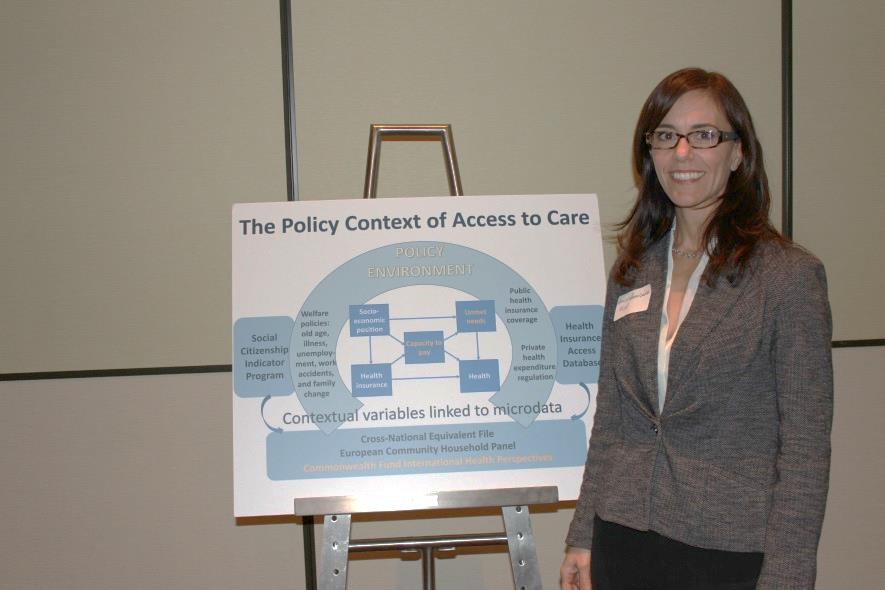
Photo: Amélie Quesnel-Vallée, McGill University
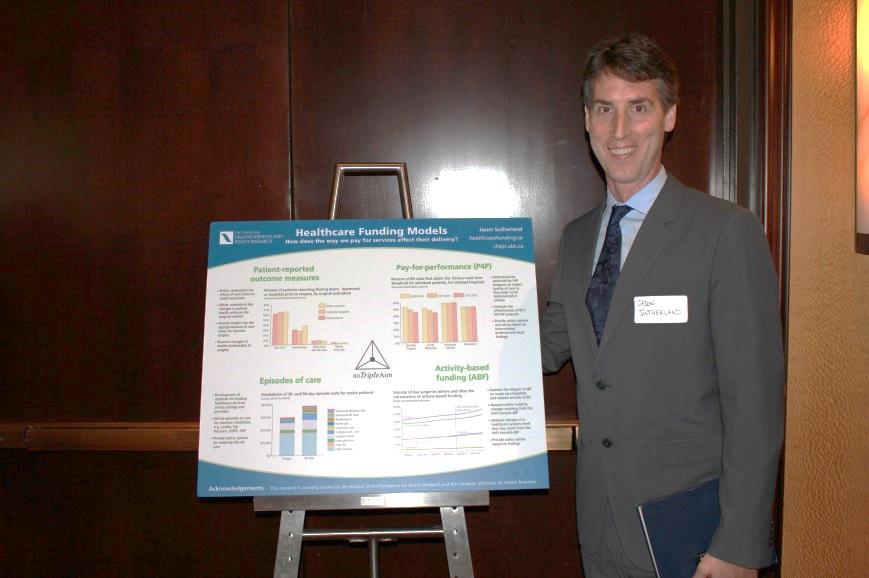
Photo: Jason Sutherland, University of British Columbia
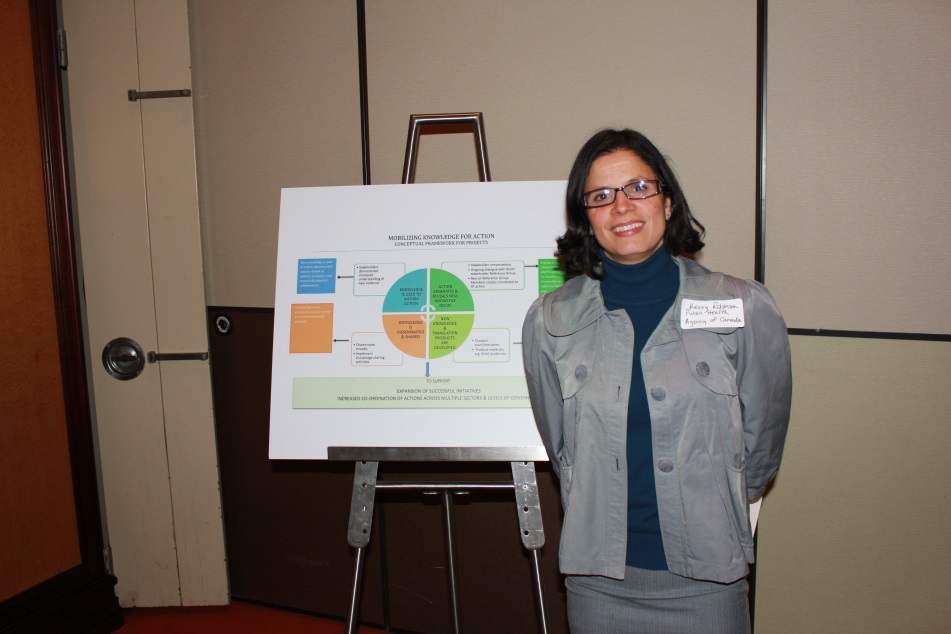
Photo: Kerry Robinson, Public Health Agency of Canada
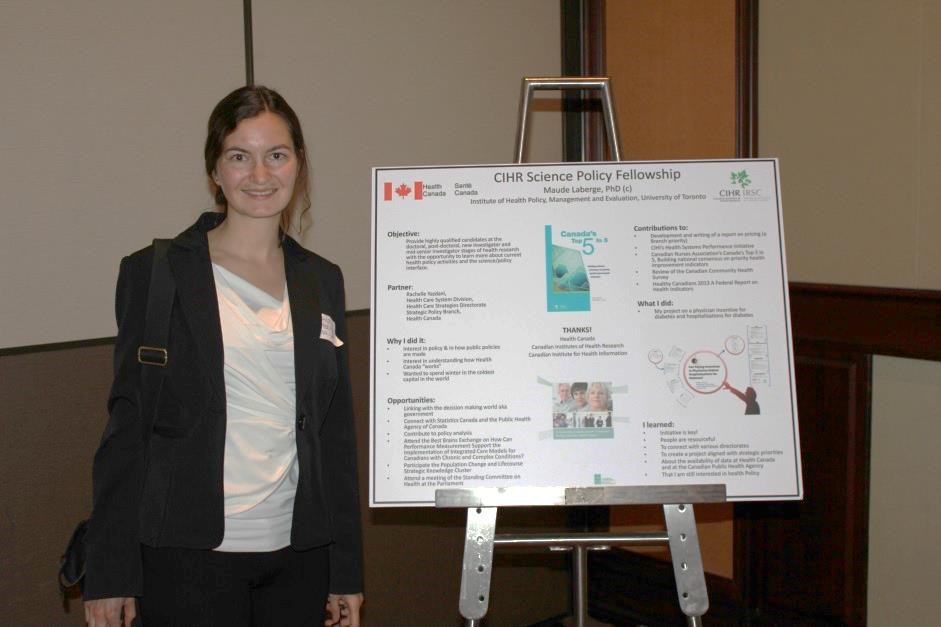
Photo: Maude Laberge, former Health Canada Science-Policy Fellow
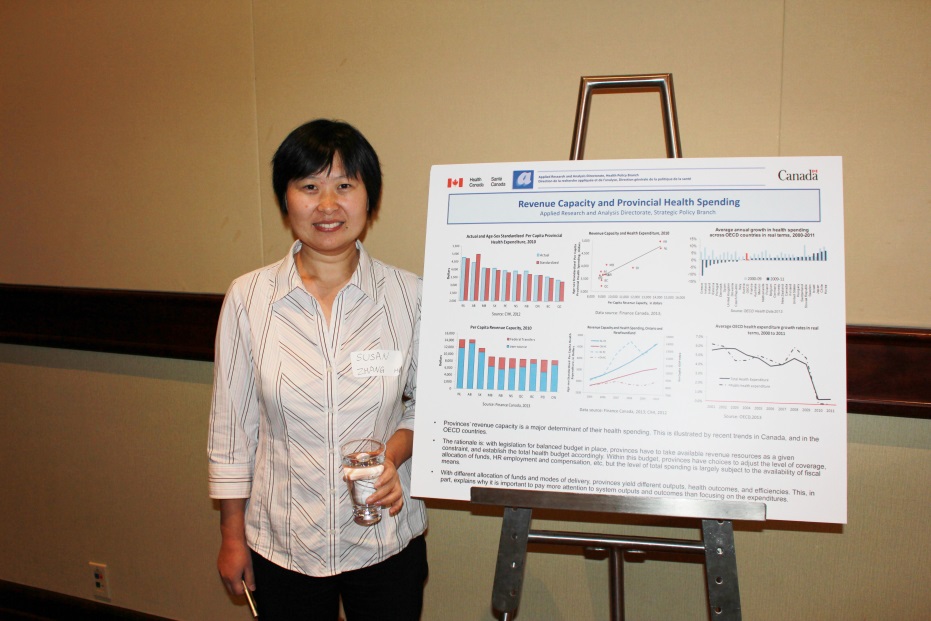
Photo: Susan Zhang, Health Canada
Additionally, guests received a live tutorial of the EIHR Portal, a continuously updated repository of policy-relevant documents that address 'healthcare renewal' in Canada.
Thanks again to all of our presenters, partners and attendees for making the event a success!
Announcements
- New IHSPR Associate Director - Susan Law
IHSPR would like to welcome new Associate, Susan Law.
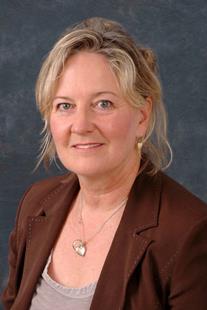
Photo: Susan Law, IHSPR Associate Director
Contact Susan and the IHSPR TeamSusan has experience in both research and management and in the management of research over 25+ years of working in and around health systems in Canada and the UK. As a funder she has worked on the creation, management and evaluation of funding programs for health services and policy research and to build capacity to produce and use the results. She has led patient engagement initiatives within hospital and community-based programs and has been leading a web-based health experiences research initiative in collaboration with McGill and Oxford universities. Susan was recently part of a project team that recommended a CIHR-like structure for funding health research in Kazakhstan.
Susan has a PhD in health policy from LSHTM, University of London, and a Master's in Health Administration from the University of Toronto. She was most recently Vice-President Academic Affairs at St. Mary's Hospital, Montreal, working to expand the hospital's academic mission. Previously she was VP Research at the Canadian Health Services Research Foundation. She has worked as a manager and researcher in Canada and the UK in areas related to planning, priority-setting, research management, public health, technology assessment, patient engagement and health experiences. She is an Associate Professor in Family Medicine at McGill University where she teaches a course on health policy and supervises graduate students in family medicine.
- Ontario/Quebec Best Brains Exchange
In early November, Ontario and Quebec participated in their first Best Brains Exchange (BBE) on Health Sector Performance Measurement. Key stakeholders from the Ontario Ministry of Health and Long-term Care (MOHLTC) and the Quebec Ministere de la santé et des services sociaux (MSSS) were present for the knowledge exchange event.

Photo: Back Row: Éric Fournier (MSSS), Antoine Groulx (MSSS), Luc Castonguay (MSSS), Michael Hilmer (MOHLTC), Paul Lee (MOHLTC), Michael Robertson (MOHLTC), Justin Peffer, Jason Sutherland (UBC), Walter Wodchis (University of Toronto), Niek Klazinga (University of Amsterdam/Organisation for Economic Co-operation and Development) , Guillermo Sandoval (MOHLTC), Terry Sullivan (Canadian Agency of Drugs and Technologies in Health Care) , Martin Hébert (MSSS)
Front row: Brigitte Côté (MSSS), Vasanthi Srinivasan (MOHLTC), Manon St-Pierre (MSSS), Geneviève Prémont (MSSS), Jeannie Haggerty (McGill University), Cathy Schoen (The Commonwealth Fund), Robyn Tamblyn (IHSPR)
- CADRE Chair Program: book launch
The Canadian Foundation for Healthcare Improvement (CFHI) and the CIHR Institute of Health Services and Policy Research are proud to have sponsored the production of the book Shaping Academia for the Public Good: Drawing out Valuable Lessons Learned. The trailblazing Chair program was launched in 2000 to address the critical shortage of Canadian capacity in applied health services and policy research. With increasing demand for evidence-based decision-making, the Chairs paved the way for today's generation of applied research and remain leaders in reducing the gap between healthcare research and practice. Dedicated to bridging this divide Shaping Academia for the Public Good: Drawing out Valuable Lessons Learned includes chapters on funding, knowledge transfer, policy frameworks, working with multiple stakeholders, and managing organizational settings. The book is a useful resource for those interested in the potential of, and unique approaches to, applied research to improve our healthcare system. - CIHR Citizen Engagement in Health Casebook
The primary purpose of the Casebook is to highlight and share some of the diverse citizen engagement activities that are occurring throughout Canada and represent a wide range of activities from across the health sector and the different regions of Canada. By presenting these unique cases, we hope to facilitate knowledge translation and exchange about citizen engagement in health and the opportunity to learn, share and discuss opportunities for further practice and policy.Each case is structured to allow the reader a quick overview of the purpose and rationale of citizen engagement processes, what methods were used for engaging citizens, the outcomes and impacts of the engagement, and the key lessons learned in each case.
The casebook includes a number of IHSPR relevant citizen engagement stories.
Conferences
- 2014 CAHSPR Conference
Abstract submission deadline: January 9, 2014
May 13 to 15, 2014 (Pre-Conference Day May 12, 2014)
Hilton Toronto, (Toronto, ON)
"Convergence of Health Policy and Evidence – Bridge Over Troubled Water"
CAHSPR's annual conference is Canada's largest gathering of health care policy makers, managers, researchers, students and stakeholders. Held at a different location every year, it is attended by 600+ delegates annually. Don't miss out on the chance to feature your work. Submit an abstract today! - 25th Annual National Forum on Quality Improvement in Health Care
December 8 to 11, 2013
Orlando, FL
This event will unite thousands of health care leaders, visionaries, and front-line practitioners from around the world. It's a unique opportunity not just to listen and learn, but to be part of changes that will impact the future of health care. The National Forum will reinvigorate you, expose you to new ways of thinking, and empower you to play an active role in what happens next through a breadth of Learning Labs, Minicourses, keynote presentations, and plentiful opportunities for networking. - 10th Annual Mobile Healthcare
January 28 to 29, 2014
Eaton Chelsea Hotel (Toronto, ON)
Determine the financial impacts of implementing mHealth technology and what the benefits will be to your healthcare organization. Mobile devices and their applications are changing many aspects of healthcare. With increasing adoption and implementation rates, healthcare organizations cannot afford to be left behind. Improve your understanding of mHealth infrastructure, wearable devices, government regulations and security. Establish and sustain an ecosystem that delivers integrated mHealth solutions. Discover how this technology is allowing patients to assert control and monitor themselves along with their healthcare providers. - CHSPR 2014 Health Policy Conference
February 25, 2014
Westin Bayshore Hotel (Vancouver, BC)
In Canada, multiple jurisdictions and organizations have implemented some form of performance measurement and reporting activities. The investments in these activities, to date, have been modest, but are likely to require substantial additional resources in the future. What are the most promising approaches to using these tools to improve healthcare within a Canadian context? How much progress has really been made to date? How should we be approaching these activities in the future to ensure that we are getting the most value from our efforts?
The goals of our 2014 conference are to engage in dialogue about:- The science of performance measurement;
- Best practices for reporting on performance.
Did You Know?
- IHSPR Policy Rounds
CIHR's Institute of Health Services and Policy Research (IHSPR) Policy Rounds are webinars that disseminate research results and foster knowledge exchange among researchers, health care policy and decision makers, and other stakeholders. IHSPR Policy Rounds showcase current research evidence on high priority topics and promote evidence-informed decision making.IHSPR Policy Round webinars are planned for this fall:
- Physician Engagement and Leadership for Health System Improvement
Friday, November 29, 2013
12:30 PM – 2:00 PM (EST)
- Physician Engagement and Leadership for Health System Improvement
- Capitalizing on Big Data: Agencies launch consultation on digital scholarship
Canada’s federal research granting agencies—the Social Sciences and Humanities Research Council (SSHRC), the Natural Sciences and Engineering Research Council (NSERC), the Canadian Institutes of Health Research (CIHR), as well as the Canada Foundation for Innovation (CFI), and in collaboration with Genome Canada—have joined forces to help address digital infrastructure challenges through the consultation document Toward a Policy Framework for Advancing Digital Scholarship in Canada.Institutions, associations, organizations and individuals may provide input on the consultation document between now and December 16, 2013. Email responses should be sent to: digitalscholarship@sshrc-crsh.gc.ca
Got good news?
Are you a CIHR-funded investigator driving innovative health services and policy research? Have you recently been published in a peer-reviewed journal? Then we want to hear from you!
Send us a research project abstract and a short summary (500 words max) of your latest game-changing outcomes and impacts for a chance to be featured in the IHSPR newsletter or website! Forward us your information to info.ihspr@mcgill.ca
- Date modified: